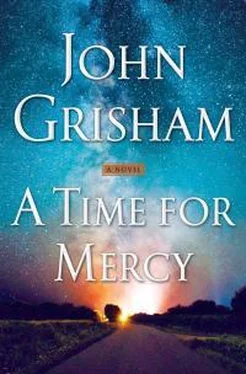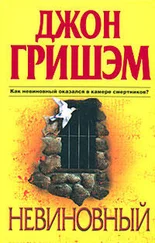Jake chuckled at the stories he’d heard about Lucien. He had been the first, and for years the only, white member of the county’s chapter of the NAACP. And later, the same for the ACLU. He had represented unions, a rarity in rural north Mississippi. He sued the state over the lousy schools for blacks. He sued the state over capital punishment. He sued the city because it refused to pave the streets in Lowtown. Until he was disbarred, Lucien Wilbanks had been a fearless lawyer who never hesitated to fire off a lawsuit when he thought one was needed, and never failed to help a client who was being mistreated.
On the sidelines now for the past eleven years, Lucien was still a loyal friend who reveled in Jake’s success. If asked, there was no doubt in Jake’s mind that Lucien would advise him to not only take on the defense of young Drew Gamble but to do so with as much noise as possible. Proclaim innocence! Demand a speedy trial! Lucien had always believed that every person charged with a serious crime deserved a good lawyer. And, Lucien had never, throughout his colorful career, dodged the attention that a bad client could bring.
Jake’s other close friend, Harry Rex, had already weighed in and there was no reason to revisit the question with him. Carla was on the fence. Noose was waiting by the phone.
He wasn’t worried about the Kofers. He didn’t know them and believed they lived in the southern part of the county. Jake was thirty-seven years old and had practiced law successfully for twelve years without that family. He could certainly prosper in the future without knowing them.
He was thinking about the cops—the city policemen, and Ozzie, and his deputies. Six days a week, Jake had breakfast four doors down at the Coffee Shop, and Marshall Prather was often there, waiting with the morning’s first insult. Jake had done legal work for many on the force and knew that he was their favorite lawyer. DeWayne Looney had testified against Carl Lee Hailey, and had stunned the jury by admitting he admired the man who blew off his leg. Mick Swayze had a crazy cousin that Jake had successfully shipped off to the state mental hospital, at no charge.
Granted, the legal work wasn’t much—wills and deeds and small stuff that Jake charged little for. Pro bono work was not unusual.
As he studied the ceiling fan, he had to admit that not a single law enforcement officer had ever brought him a decent case. And wouldn’t they understand if he represented Drew? Sure they were in shock at the murder of a colleague, but they realized that someone, some lawyer, had to represent the accused. Might they feel better if the lawyer was Jake, a friend they trusted?
Was he about to make a courageous decision, or the biggest mistake of his career?
He finally walked to his desk, picked up the phone, and called Carla.
Then he called Judge Noose.
6
It was dark when he left the office and even darker as he walked around the deserted square. It was almost eight on a Sunday night and not a single store or café was open. The jail, however, was bristling with activity. As he turned down the street and saw the fleet of patrol cars parked haphazardly around the buildings, and the news trucks—one from Tupelo, one from Jackson—and the crowd of men loitering outside smoking and talking quietly, a sharp pain hit low in his stomach. He felt as though he was walking directly into enemy territory.
He knew the layout well and decided to duck down a side street and enter the sprawling office complex through a rear door. The buildings had been enlarged and renovated over time and with no clear plan as to what might be constructed next. Along with the twenty or so cells and holding rooms and reception areas and cramped hallways, the complex housed the sheriff’s department on one end and the Clanton City Police on the other. For the sake of simplicity, all of it was simply referred to as the “jail.”
And on that dark night the jail was packed with every person even remotely connected to law enforcement. It was indeed a brotherhood; the comfort in being with others who wore the badge.
A jailer told Jake that Ozzie was in his office with the door locked. Jake asked him to inform the sheriff that he needed to speak with him and would wait outside near the yard, a fenced area where the inmates often played basketball and checkers. In good weather, Jake and the other lawyers in town would sit on an old picnic table under a tree and chat with their clients through the chain-link fence. At night, though, the yard was dark as all prisoners were locked away. Their small cell windows were secured by rows of thick bars.
At that moment, Jake had no clients serving time in the jail, other than his latest one. He had two boys at the state penitentiary at Parchman, both for selling drugs. One had a mother with a big mouth and was blaming Jake for their family’s demise.
A door opened and Ozzie appeared, alone. He strolled over, in no hurry, as if his shoulders were weighted, as if he hadn’t slept in days. Instead of extending a hand, he cracked his knuckles and gazed across the yard.
“Rough day,” Jake said.
Ozzie grunted and said, “The worst one yet. Got the call at three this mornin’ and haven’t slowed down since. It’s tough losin’ a deputy, Jake.”
“I’m sorry, Ozzie. I knew Stu and liked him. I can’t imagine what you guys are going through.”
“He was a great guy, kept us all in stitches. Maybe a darker side, but we can’t talk about that.”
“And you’ve met with his family?”
Ozzie took a deep breath and shook his head. “I drove out, paid my respects. They’re not the most stable people I’ve met. They’ve called here this afternoon askin’ about the boy. Two of them showed up at the hospital, said they wanted to talk to the boy’s mother. Crazy stuff like that. So now I’ve got a deputy parked outside her room. You better watch these guys, Jake.”
Just what the little Brigance family needed. More crazies to worry about.
Ozzie cleared his throat and spat on the ground. “I just talked to Noose.”
“So did I,” Jake said. “He wouldn’t take no.”
“He told me he leaned on you, said you didn’t want to get involved.”
“Who would, Ozzie? Certainly nobody from around here. Noose promised me he would try to find a lawyer from outside the county, so I’m just sort of standing in for the preliminaries. At least that’s the plan.”
“You don’t sound too sure.”
“I’m not. These cases are not easy to get rid of, especially when the rest of the bar goes into hiding and won’t take calls from the judge. There’s a good chance I’ll get stuck with it.”
“Why couldn’t you just say no?”
“Because Noose is standing on my neck and because there’s no one else, not now anyway. It’s hard to say no to a circuit judge, Ozzie.”
“Sounds like it.”
“He pushed pretty hard.”
“Yeah, that’s what he said. I guess we’re on opposite sides here, Jake.”
“Aren’t we usually on opposite sides? You bring ’em in, I try to get ’em off. Both doing our jobs.”
“I don’t know. This seems different. I’ve never buried a deputy before. Then we’ll have a trial, a big one, and you’ll do what good lawyers are supposed to do. Get the kid off, right?”
“That day is far away, Ozzie. I’m not thinking about a trial right now.”
“Try thinkin’ about a funeral.”
“I’m sorry, Ozzie.”
“Thanks. Should be a fun week.”
“I need to see the kid.”
Ozzie nodded to a row of windows on the back side of the jail’s most recent addition. “Right there.”
“Thanks. Do me a favor, Ozzie. Marshall, Moss, DeWayne, those guys are my friends, and they won’t like this at all.”
Читать дальше












![Джон Гришэм - Апелляция [Фейк]](/books/403002/dzhon-grishem-apellyaciya-fejk-thumb.webp)